Trump tariffs hit 13 Mena states
4 April 2025
Over a dozen Middle East and North Africa (Mena) countries will face US President Donald Trump's reciprocal tariffs – at rates varying between 10% and 41% – from 5 April.
Trump announced an executive order on 2 April regarding “regulating imports with a reciprocal tariff to rectify trade practices that contribute to large and persistent annual US goods trade deficits”.
Six of these countries – Egypt, Kuwait, Morocco, Qatar, Saudi Arabia and the UAE – face 10% tariffs, which is the minimum rate, or universal tariff, imposed on US trading partners.
Goods from Syria and Iraq face the highest tariff rates of 41% and 39%, followed by Libya and Algeria, which each face tariffs of 31% and 30%, respectively.
The executive order imposes 28% tariffs on goods originating from Tunisia, 20% from Jordan and 17% from Israel.
The impact of the new tariffs on regional businesses is less clear compared to their effect on US consumers, who will have to bear the brunt of increased prices of imported products.
US media outlets report that goods included in the reciprocal tariff regime include electronics, automobiles, clothing and shoes, wine and spirits, furniture, coffee and chocolates.
Dubai-based global ports operator DP World said that businesses will face significant adjustments in response to the tariffs, according to a report by the UAE’s The National.
“With tariffs increasingly shaping policy, we recognise that businesses are facing significant adjustments. As supply chains realign, new manufacturing and trading hubs may emerge in response to shifting cost structures and market access considerations,” DP World said.
The firm added that it is working closely “with our customers to navigate these complexities – helping them maintain continuity, find efficiencies and build resilience in an evolving global landscape”.
Photo credit: Pixabay, for illustrative purposes only
Exclusive from Meed
-
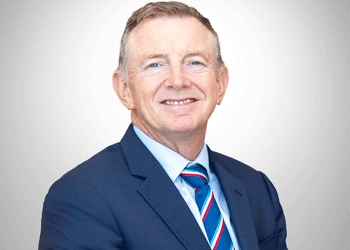 Abu Dhabi’s Enersol charts acquisitions path
Abu Dhabi’s Enersol charts acquisitions path26 February 2026
-
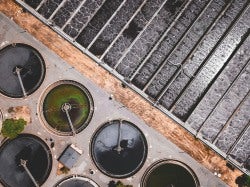 Dubai plans EPC tender for Warsan sewage treatment plant
Dubai plans EPC tender for Warsan sewage treatment plant25 February 2026
-
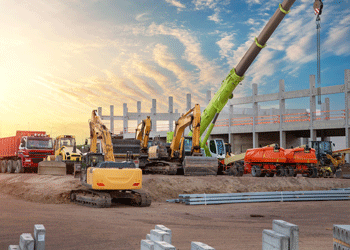 Aramco firm and Arcapita sign logistics facility deal
Aramco firm and Arcapita sign logistics facility deal25 February 2026
-
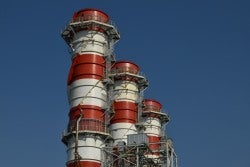 Algeria gives bidders more time for 1.2GW plant
Algeria gives bidders more time for 1.2GW plant25 February 2026
-
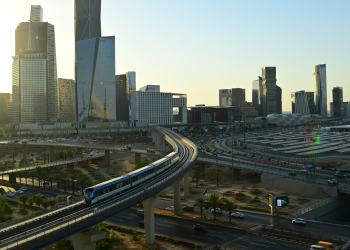 Riyadh tenders Line 7 metro project management deal
Riyadh tenders Line 7 metro project management deal25 February 2026
All of this is only 1% of what MEED.com has to offer
Subscribe now and unlock all the 153,671 articles on MEED.com
- All the latest news, data, and market intelligence across MENA at your fingerprints
- First-hand updates and inside information on projects, clients and competitors that matter to you
- 20 years' archive of information, data, and news for you to access at your convenience
- Strategize to succeed and minimise risks with timely analysis of current and future market trends

Related Articles
-
 Abu Dhabi’s Enersol charts acquisitions path
Abu Dhabi’s Enersol charts acquisitions path26 February 2026

With about half of its $1.5bn seed capital still available to deploy, Abu Dhabi- based oil and gas drilling services firm Enersol is firmly on a growth trajectory driven by acquisitions. Since its establishment in November 2023 as a 51:49 joint venture of Adnoc Drilling – a subsidiary of Abu Dhabi National Oil Company (Adnoc Group) – and holding company Alpha Dhabi, Enersol has pursued inorganic growth as its core expansion strategy.
 Having completed four key acquisitions to date, Enersol is now targeting opportunities that will not only expand its portfolio but also enhance the value of its offerings to customers, says the company’s CEO, Dean Watson.
Having completed four key acquisitions to date, Enersol is now targeting opportunities that will not only expand its portfolio but also enhance the value of its offerings to customers, says the company’s CEO, Dean Watson.“The unifying theme that we want to focus on is around the production side of what we call the well lifecycle. Why is that important? For investors it is super important because that’s where we get to the opex [operating expenditure] side, moving away from capex [capital expenditure], achieving completions and recurring revenues. So, with the potential target acquisitions, that’s where we’re focused on,” Watson explains.
“We think that they [future acquisitions] are going to unify and anchor our current portfolio,” he tells MEED in an interview.
“We have a lot of dry powder to spend. We have identified targets that we want to go after. We are pursuing a few targets,” Watson says, without revealing details. “With the targets we are after, we want to make sure that they’ve got a presence here in the UAE and Mena. We’re also looking for a global footprint.”
Completed acquisitions
Enersol became the majority shareholder in US oil and gas drilling firm Gordon Technologies in 2024, acquiring a 67.2% stake through two transactions with a combined value of $387m.
Louisiana-based Gordon Technologies provides measurement while drilling (MWD) technology. MWD technology captures critical data near the drill bit and transmits it to the surface in real time without interrupting normal drilling operations.
“Gordon Technologies are number one in North America, by a long way, in terms of market share percentage. It’s quite amazing how big that difference is in terms of how much they dominate [in] North America,” Watson says about the rationale behind Enersol acquiring the majority stake.
Enersol then initiated a $58m transaction in July 2024 to acquire a 51% majority stake in UAE-based oil and gas services provider NTS Amega from Alpha Dhabi.
“NTS Amega is a manufacturing business with a rental component,” Watson explains. “It manufactures a product and rents out a portion of it. What excites us about NTS Amega is its potential to serve as our manufacturing backbone, helping to strengthen and promote our in-country value, as it is based and originated in the UAE.”
In August of the same year, Enersol started a transaction to fully acquire US-headquartered EV Holdings Limited, paying $45m to UK-based private equity firm Dunedin for 100% of the company’s shares.
EV Holdings has a significant technology portfolio, with more than 100 pieces of intellectual property, primarily patents. It is a highly technical company that generates vast amounts of data, Watson explains.
Aligned with Enersol’s focus on technology leadership, EV is the number one provider of downhole camera technology in oil field services. It therefore meets what Watson calls “the key investment criteria we are looking for”.
In November 2024, Enersol entered into a $223m deal to acquire a 95% equity stake in US-based Deep Well Services (DWS).
The acquisition, which was completed in the first quarter of 2025, gives Enersol access to DWS’s hydraulic completion units, complemented by its data analytics software, BoreSite, as well as accredited training programmes designed to enhance operational safety and efficiency.
We have a lot of dry powder to spend. We have identified targets that we want to go after. We are pursuing a few targets
Dean Watson, EnersolSecuring contracts
Enersol is seeking to leverage the suite of capabilities and technologies it has acquired to secure oil field services contracts in the UAE and the wider regional market, Watson says.
“We’re very excited about being part of the Adnoc ecosystem. Gordon Technologies, through Turnwell, has just completed its first batch of wells and is currently working on the Turnwell project,” the Enersol CEO says, adding: “Gordon is the MWD provider on that project.”
Adnoc Drilling signed a term sheet in 2024 to enter into a partnership with the Middle East arm of US oil field services provider SLB and US firm Patterson-UTI International Holdings to form a new company called Turnwell Industries.
In May of that year, Adnoc Drilling was awarded a major contract, worth about $1.7bn, by its parent Adnoc Group, to provide drilling and associated services for the recovery of unconventional oil and gas resources. Work on this contract is being executed by Turnwell. The broad scope of work on the contract covers drilling and appraisal of 144 unconventional oil and gas wells.
Separately, DWS won its first contract from Malaysia’s state energy company Petronas last November for deploying its hydraulic completion units and BoreSite systems to support a 12-well unconventional programme in Abu Dhabi.
Watson is optimistic about Enersol securing additional work in Abu Dhabi from Adnoc Drilling. Beyond its home market, the company is “in active discussions and negotiations with our Saudi joint-venture partner on a major scope of work with Saudi Aramco,” he says.
Enersol’s growing portfolio and its push to secure contracts across the region also place the company in competition with established oil field services majors. On that subject, Watson concludes: “I believe our offering is unique and does not necessarily compete directly with companies such as SLB or Weatherford.
“We will identify a niche that fits between the major players and deliver parallel value through our differentiated offering.”
https://image.digitalinsightresearch.in/uploads/NewsArticle/15780622/main.gif -
 Dubai plans EPC tender for Warsan sewage treatment plant
Dubai plans EPC tender for Warsan sewage treatment plant25 February 2026

Register for MEED’s 14-day trial access
Dubai Municipality is preparing to tender the main construction package for the Warsan sewage treatment plant (STP) by the end of the year, according to sources close to the project.
The scheme is linked to the deep sewerage tunnels infrastructure programme being implemented by the municipality’s sewerage and recycled water projects department.
As MEED understands, the Warsan STP had previously been expected to be procured as a public-private partnership (PPP) scheme.
However, sources confirmed that the main construction package will now be procured as an engineering, procurement and construction (EPC) contract.
The project involves the construction of a sewage treatment plant with a capacity of about 175,000 cubic metres a day (cm/d), including treatment units, sludge handling systems and associated infrastructure.
The plant, estimated to cost about $326m, will be developed at the existing Warsan complex, where the municipality is also progressing separate expansion and rehabilitation packages.
These include Warsan STP Phase 1 (DS-355/1), which involves sewerage and stormwater network upgrades, and Stage 2 of the Al-Warsan sewage treatment plant (DS-203/2), comprising new treatment units
Kuwait-headquartered Mohammed Abdulmohsin Al-Kharafi & Sons is the main EPC contractor for both projects.
Separately, the municipality is also progressing the expansion and upgrade of the first and second phases of the Jebel Ali STP.
The upgraded facility will be capable of treating an additional sewage flow of 100,000 cm/d.
Earlier this month, contractors were invited to prequalify for the contract.
The bid submission deadline is 2 April.
https://image.digitalinsightresearch.in/uploads/NewsArticle/15765751/main.jpg -
 Aramco firm and Arcapita sign logistics facility deal
Aramco firm and Arcapita sign logistics facility deal25 February 2026
Asmo, the logistics joint venture of Saudi Aramco and DHL Supply Chain, has signed an agreement with Bahrain‑headquartered Arcapita Group Holdings to deliver a 1.4-million-square-metre (sq m) built-to-suit logistics complex at King Salman Energy Park (Spark).
The project will feature a 43,000 sq m temperature-controlled, Grade A warehouse, more than 3,000 sq m of office and staff amenities, 5,300 sq m dedicated to chemical storage, and an open yard spanning about 1.2 million sq m.
Planned for large-scale industrial use, the site is expected to incorporate advanced warehouse and building management systems, end-to-end digital connectivity, automation and robotics.
It will also be developed in line with internationally recognised sustainability standards, featuring solar (photovoltaic) readiness, EV charging infrastructure and a target of LEED Gold certification.
The development is aimed at supporting the next stage of Saudi Arabia’s logistics and supply chain expansion.
Under the deal structure, Arcapita will provide funding and retain ownership of the asset, while Asmo will develop the facility and then lease and operate it under a 22-year occupational lease.
According to a statement, “the scheme will be executed via a forward-funding model, underscoring a long-term commitment to national infrastructure”.
Asmo added that this will be its first purpose-built logistics centre and one of four strategic locations planned to anchor its nationwide logistics network, aligned with the National Transport and Logistics Strategy (NTLS) under Saudi Vision 2030.
https://image.digitalinsightresearch.in/uploads/NewsArticle/15765085/main.gif -
 Algeria gives bidders more time for 1.2GW plant
Algeria gives bidders more time for 1.2GW plant25 February 2026
Algeria’s state-owned electricity and gas utility Sonelgaz has extended the bid submission deadline for a contract to build a 1,200MW combined-cycle gas-fired power plant in Adrar.
The project is being procured through Sonelgaz’s power generation subsidiary, Societe Algerienne de l’Electricite et du Gaz – Production de l’Electricite (SPE).
The new bid submission deadline is 29 April. The main contract was first tendered in April last year, and the deadline has been extended several times since.
The latest deadline was 26 February.
The tender is open to local and international companies with experience in delivering large-scale power generation projects and with sufficient technical and financial capacity.
Algeria’s wider power sector has experienced periods of limited contract activity in recent years. Between 2018 and 2022, virtually no new solar or wind farm contracts were awarded, according to available data from the regional projects tracker MEED Projects.
In 2023, Sonelgaz Energie Renouvelables, a subsidiary of Algeria’s state-owned utility, awarded 14 of the 15 solar photovoltaic (PV) packages it tendered that year.
At the time, MEED reported that the 15 packages had a total combined capacity of 2,000MW, requiring at least AD172bn ($1.2bn) of investment.
However, publicly available data suggests that progress has been slow with several schemes yet to reach full construction or commercial stages.
Gas-fired combined-cycle plants continue to account for the majority of Algeria’s electricity generation capacity. Data from MEED Projects indicates that more than 5,000MW of oil- and gas-fired power capacity is currently under construction.
Despite this, new contract awards in 2025 came from three solar schemes.
This included the construction of a 154MW solar PV plant in Bechar, for which China Power was appointed main contractor in August.
https://image.digitalinsightresearch.in/uploads/NewsArticle/15765079/main.jpg -
 Riyadh tenders Line 7 metro project management deal
Riyadh tenders Line 7 metro project management deal25 February 2026

Register for MEED’s 14-day trial access
The Royal Commission for Riyadh City (RCRC) has issued a tender inviting firms to bid for a contract for project management consultancy services for the construction of Riyadh Metro Line 7.
MEED understands that RCRC has allowed firms until March to submit their proposals.
The latest development follows contractors submitting bids on 31 January for a contract to design and build the project.
The project involves constructing a metro line linking the Qiddiya entertainment city development, King Abdullah International Gardens, King Salman Park, Misk City and Diriyah Gate. The total length of the line will be about 65 kilometres (km), of which 47km will be underground and 19km will be elevated.
The line will have 19 stations, 14 of which will be built underground and five above ground.
Riyadh Metro’s first phase features six lines with 84 stations. The RCRC completed the phased roll-out of the Riyadh Metro network when it started operating the Orange Line in January this year.
Construction has also begun on the next phase of Riyadh Metro, the extension of Line 2.
In July last year, MEED exclusively reported that RCRC had awarded an estimated $800m-$900m contract for the project.
The contract was awarded to the Arriyadh New Mobility Consortium, led by Italy’s Webuild.
The group also includes India’s Larsen & Toubro, Saudi Arabia’s Nesma & Partners and France’s Alstom.
Line 3, also known as the Orange Line, stretches from east to west, from Jeddah Road to the Second Eastern Ring Road, covering a total distance of 41km.
The line spans 8.4km, of which 1.3km is elevated and 7.1km is underground. It includes five stations – two elevated and three underground.
It will run from the current terminus of Line 2 at King Saud University (KSU) and continue to new stations at KSU Medical City, KSU West, Diriyah East and Diriyah Central – where it will interchange with the planned Line 7 – before terminating at Diriyah South.
https://image.digitalinsightresearch.in/uploads/NewsArticle/15764750/main.png


